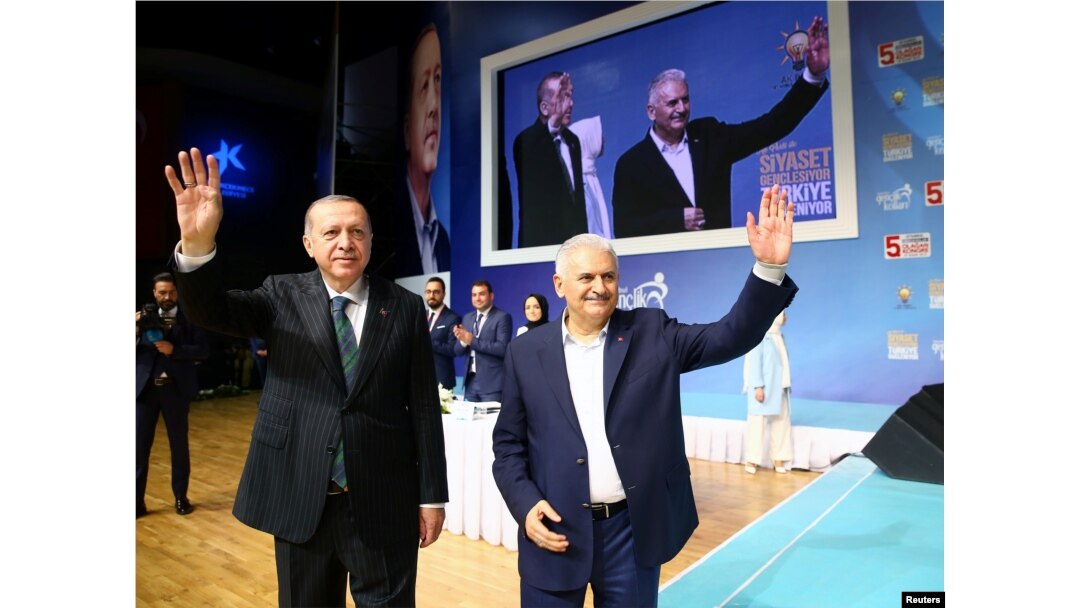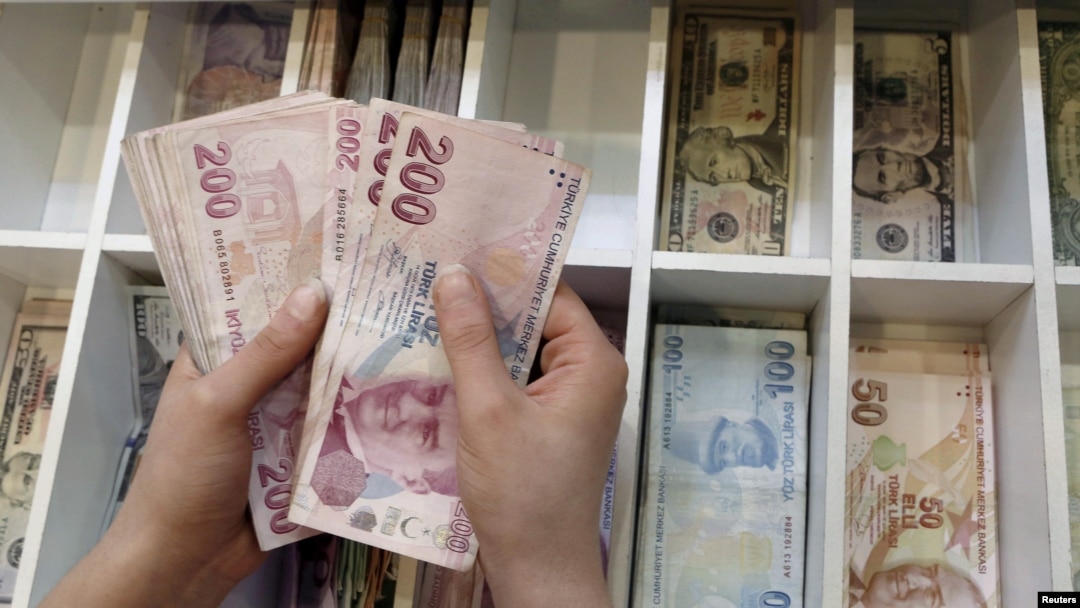With snap elections in Turkey less than two months away, the government has begun investing billions of dollars in financial giveaways in an unprecedented spending spree that has sent the lira to near record lows and prompted concerns about the health of the economy.
The currency fell by nearly 2 percent against major currencies Wednesday in response to Prime Minister Binali Yildirim's announcement of a $5.9 billion spending package. Along with tax social security payment amnesties, the bulk of the spending is to be split into two payments of 1,000 lira — the equivalent of $240 — to 13 million pensioners. The payments are timed to coincide with religious holidays, with the first installment set to be paid a week before the June 24 vote.

FILE - Turkish President Recep Tayyip Erdogan and Prime Minister Binali Yildirim greet their supporters during a meeting of the ruling AK Party in Istanbul, Turkey, April 29, 2018.
The unprecedented level and nature of the spending caught the financial markets by surprise.
"When the elections were first announced, there was an assumption given the very short time until the elections, the government cannot significantly let fiscal balances deteriorate," said economist Inan Demir of Nomura Securities.
"Given this spending commitment can be recurring for coming years, it shows there can be more lasting damage to the fiscal balances than what the market assumed at the announcement of the election," Demir added.
In another sign of investor concerns, the S&P rating agency downgraded Turkey's credit rating.
"Our downgrade reflects our view that there is a risk of a hard landing for Turkey's overheating, credit-fueled economy," a statement from S&P read. "The ongoing weakness of the Turkish lira is not only fueling inflation, but also amplifying risks related to Turkey's high external debt."
The lira already has suffered heavy losses this year amid growing investor concern over a government policy of stimulating growth through cheap loans and expenditures.
Deputy Prime Minister Mehmet Simsek criticized the announcement of the S&P downgrade.
"The timing of the decision is very meaningful," tweeted Simsek. Ankara routinely accuses international investors and rating agencies of conspiring against it.
The ruling AK Party has, in the past, shunned election spending giveaways. In the June 2015 election, the main opposition CHP was condemned for advocating almost identical policies to those announced this week.
No certain victory
Analysts interpret the sudden spending as a declaration of intent by President Recep Tayyip Erdogan and the AKP, whom polls indicate remain short of winning the vote by an absolute majority.
FILE - Turkey's President Recep Tayyip Erdogan announces early presidential and parliamentary elections for June 24, 2018, at the Presidential Palace, in Ankara, Turkey, April 18, 2018.
"It's [elections] not in the pocket. He [Erdogan] would like to ensure he will win, because he has no luxury to lose, as simple as that," political scientist Cengiz Aktar said.
The June elections will usher in an executive presidential system, giving sweeping powers to the new president. Observers see the polls as an effort by Erdogan to consolidate his authority.
While Erdogan remains well ahead in opinion polls, most surveys indicate he remains short of the required 50 percent plus one vote to win outright. Equally, the AKP still is not assured of victory, with the traditionally splintered opposition working hard to unite. The opposition also is targeting economic discontent.
Although the economy is growing at more than 7 percent, due to massive government spending and cheap business loans, unemployment and inflation remain in the double digits.
Eighty percent of people polled this month registered dissatisfaction with the economy, a figure up from 62 percent in March.
The Organization for Economic Cooperation and Development, or OECD, noted that 29 percent of people between the ages of 15 and 29 were out of work or not in education or training, the lowest number among its 35 members.
"The voter might attend the ballot box to register his or her protest with AKP's impoverishing growth policies," said analyst Atilla Yesilada of Global Source Partners.
Commitment to winning
The AKP spending commitments are being widely seen as a shrewd move to address voter discontent, but also a possible sign of the party's commitment to winning, whatever the financial cost.
"I think it [spending] will be hugely popular. But if they don't see any movements in the polls, we may see more measures. He [Erdogan] is not taking anything for granted and the size of the expenditure shows he wants to pull all levers necessary to secure a first-round victory and majority in parliament," economist Demir said.
International investors were widely seen as welcoming Erdogan's call for snap elections, in the belief a swift victory for the president and his AKP would usher in a new period of political and economic stability and continuity. Analysts warn the growing financial cost of the election, however, can only add to growing unease among investors.


